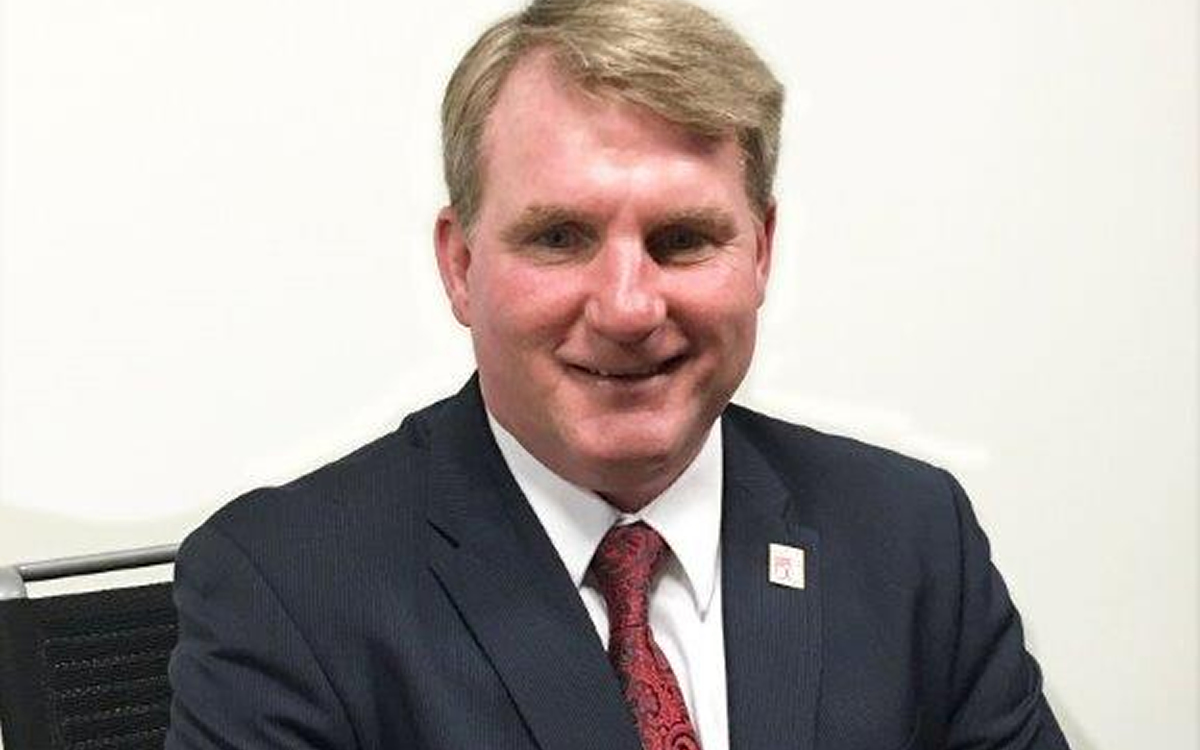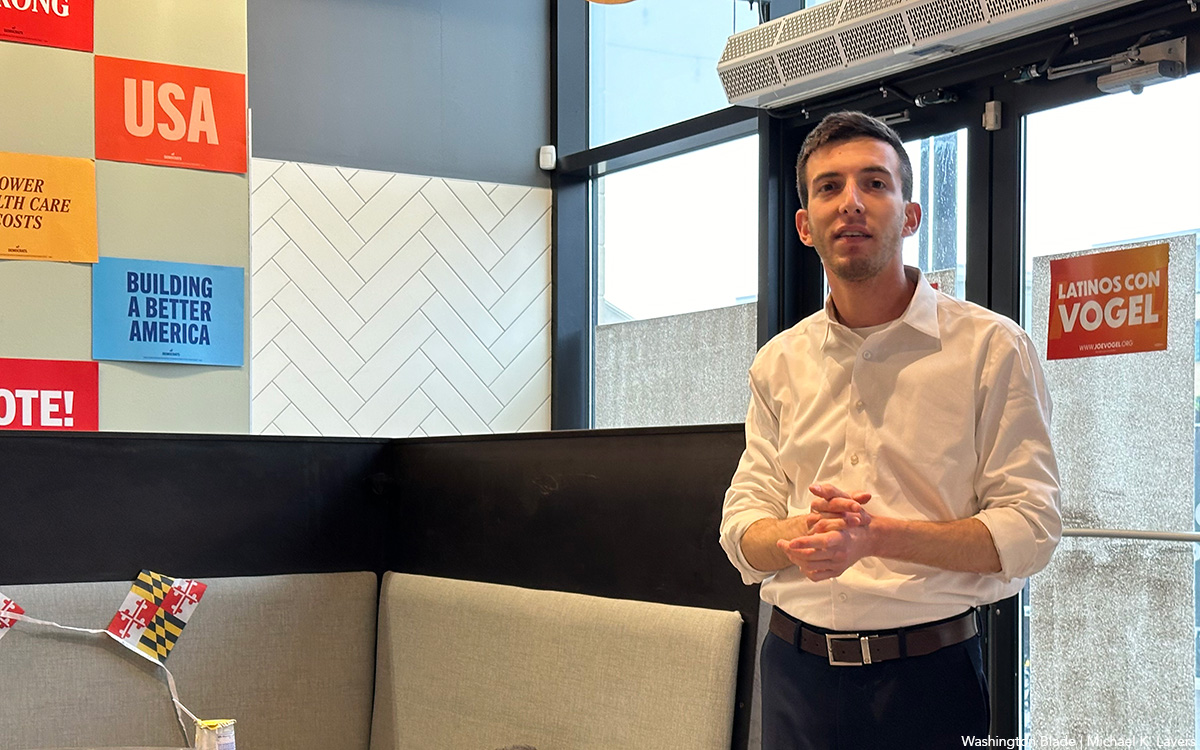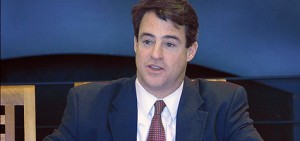Local
Md. may recognize out-of-state gay marriages
Attorney general issues opinion as D.C. couples prepare to wed
Maryland Attorney General Douglas Gansler issued a long-awaited opinion Wednesday saying same-sex marriages performed in other states or countries most likely would have full legal standing in the state.
But in his 53-page legal opinion, Gansler said the Maryland Court of Appeals would have the final say in the matter should opponents of same-sex marriage choose to contest the legal standing of married same-sex couples living in or visiting the state.
Gansler’s opinion comes one week before a law allowing same-sex marriages to be performed in D.C. is expected to take effect March 3. Same-sex couples in Maryland have said they would likely make wedding plans in the District in response to a favorable opinion from Gansler.
The attorney general’s opinion comes nine months after state Sen. Richard Madaleno (D-Montgomery County), who is gay, asked Gansler to issue an official opinion on the question of whether the state could legally recognize same-sex marriages from other jurisdictions.
“You have asked whether those marriages may be recognized under state law,” Gansler said in his opinion, which is addressed to Madaleno. “The answer to that question is clearly ‘yes.’”
Madaleno could not immediately be reached for comment, but he told the Washington Post in a brief interview that changes in state policy could now result from a court ruling, legislation or administrative action, though none of those is imminent.
Gansler says in the opinion that while he believes the legal concept of state “public policy” favors recognition of out-of-state gay marriages, others might raise legal grounds to contest that view.
In particular, he points to the 2007 ruling by the Maryland Court of Appeals upholding the state’s marriage law banning same-sex marriages from being performed in the state. In that 4-3 ruling denounced by LGBT activists, the court ruled that restricting marriage to a man and a woman doesn’t discriminate against same-sex couples or deny them rights under the state constitution. The court held that the ban on same-sex marriage instead promotes the state’s “interest” in traditional heterosexual marriage as a means of fostering procreation and protecting children.
But Gansler says in his opinion that the appeals court decision should not be a key factor in determining whether Maryland could recognize same-sex marriages from other jurisdictions.
“The Court of Appeals would start from the general principle that a marriage that is valid in the place of celebration remains valid in Maryland,” he said in his opinion. “There are exceptions to that rule if the particular marriage is contrary to a strong state public policy. A statute that limits marriage in Maryland to opposite-sex couples could be said to embody a policy against same-sex marriage.”
However, Gansler noted that the Court of Appeals has not prevented the state from recognizing various types of marriages performed in other states that are not allowed to be performed in Maryland under the state’s marriage law. Among them are common law marriages, which are recognized in many other states. The Court of Appeals also upheld a Rhode Island marriage between an uncle and a niece, even though the Maryland marriage law prohibits such a marriage, Gansler says in his opinion.
“While the matter is not free from all doubt, in our view, the court is likely to respect the law of other states and recognize a same-sex marriage contracted validly in another jurisdiction,” he says. “In light of Maryland’s developing public policy concerning intimate same-sex relationships, the court would not readily invoke the public policy exception to the usual rule of recognition.”
In response to a second question raised by Madaleno, Gansler says in his opinion that Maryland Gov. Martin O’Malley does not have authority to issue an executive order recognizing same-sex marriages from other jurisdictions.
In his May 19, 2009, letter to Gansler requesting the same-sex marriage recognition opinion, Madaleno pointed out that New York Gov. David Paterson issued such an order, clearing the way for New York to recognize out-of-state same-sex marriages, even though the legislature had not approved a same-sex marriage bill.
“An executive order of the governor must be consistent with existing Maryland law, as enacted by the General Assembly and construed by the courts,” Gansler says.
LGBT rights groups hailed Gansler’s opinion as an important breakthrough for the marriage equality movement.
“Today is a day to celebrate,” said Morgan Meneses-Sheets, executive director of Equality Maryland, a state LGBT advocacy group.
“Equality Maryland applauds a favorable opinion released by the Office of Attorney General Doug Gansler that states that the marriages of same-gender couples legalized in other jurisdictions have standing to be honored here at home.”
But Rick Bowers, director of Christian Impact Alliance, a Maryland group opposed to same-sex marriage, said Gansler acted without legal authority to issue such a ruling.
“The governing body over a decision like this should be the General Assembly or the people of the state of Maryland through a vote by referendum,” Bowers said.
Gay rights groups, however, disputed Bowers assessment, saying Gansler has authority to issue such an opinion.
Lambda Legal, a national LGBT group, praised Gansler’s opinion for “saying that recognition of out-of-state marriages of same-sex couples is consistent with Maryland law.”
Susan Sommer, director of the group’s Constitutional Litigation program, said the Gansler opinion “should bring some peace of mind to married same-sex couples and their families in Maryland as this state aligns itself with New York, making clear that there is no gay exception to long-standing marriage recognition law.”
Evan Wolfson, executive director of the national same-sex marriage advocacy group Freedom to Marry, said he was confident that the Maryland Court of Appeals would uphold Gansler’s assessment that valid same-sex marriages from other jurisdictions have full legal standing in Maryland.
“Maryland’s typical practice, like all states historically, is to honor marriages rather than destabilize them,” Wolfson said. “The Maryland Attorney General is concluding, looking at Maryland law, that there is no reason for a gay exception to that tradition and common sense practice.”
While praising Gansler’s opinion as an important development for same-sex marriage equality, some LGBT organizations said it focuses attention on the need for all states to adopt same-sex marriage laws.
“Today’s opinion by the Maryland Attorney General only continues to further highlight the burdensome patchwork of unequal laws same-sex couples face across the country,” said Joe Solmonese, president of the Human Rights Campaign. “With every step that is taken in the progress toward full equality, it becomes more and more obvious that separate is not equal and marriage by any other name is not marriage.”
The action by Gansler on Wednesday also comes less than a month after the Maryland House Judiciary Committee voted 12-8 to defeat a bill that would have banned same-sex marriage in the state. The measure was introduced by Del. Emmett Burns (D-Baltimore County), who said he anticipated Gansler’s opinion would back same-sex marriage recognition.
Maryland Del. Don Dwyer (R-Anne Arundel County), meanwhile, is “definitely” moving ahead with plans to file impeachment papers against Gansler for his same-sex marriage recognition opinion, according to spokesperson Louisa Baucom.
“His position about the opinion is that Attorney General Gansler had no right to issue the opinion, regardless of what the opinion is — that his constitutional limitations prohibit that,” Baucom said.
“He will be drawing up letters of impeachment against Attorney General Gansler,” she said, adding that the charges would be based on “violation of his oath of office.”
District of Columbia
Taste of Point returns at critical time for queer students
BIPOC scholar to speak at Room & Board event on May 2

The Point Foundation will kick off May with its annual Taste of Point DC event. The event will be hosted at Room & Board on 14th Street and feature a silent auction, food tastings, a speech from a scholar, and more.
Point’s chief of staff, Kevin Wright, said that at Taste of Point, the scholars are the star of the show.
“People never come to an event to hear Point staff speak, they come to hear from the people most impacted by the program,” he said. “At its core Taste of Point is designed to center and highlight our scholars’ voices and experiences.”
This year, a Point BIPOC Scholar, Katherine Guerrero Rivera will speak at the event.
“It is a great opportunity to highlight the scholars out there on the front lines making impacts in almost every sector and job field,” Wright said.
Wright pointed out that this year especially is a pivotal time for LGBTQ students.
“In 2023, there were 20 states that passed anti-LGBTQ legislation,” he said. “By this point in [2024] we already have more.”
Wright said the impacts of those legislative attacks are far reaching and that Point is continuously monitoring the impact they have on students on the ground.
Last month, The Washington Post reported that states with anti-LGBTQ laws in place saw school hate crimes quadruple. This report came a month after a non-binary student, Nex Bennedict, died after being attacked at school.
“So, we see this as a critical moment to really step up and help students who are facing these challenges on their campus,” Wright said. “Our mission is to continue to empower our scholars to achieve their full academic and leadership potential.”
This year Point awarded nearly 600 LGBTQ students with scholarships. These include the flagship scholarship, community college scholarship and the BIPOC scholarship. When the foundation started in 2002, there were only eight scholarships awarded.
Dr. Harjant Gill is one of those scholars who said the scholarship was pivotal for him. Gill said he spent his undergraduate years creating films and doing activism for the LGBTQ community.
As a result, his academic record wasn’t stellar and although he was admitted into American University’s graduate program he had no clue how he would fund it.
Upon arrival to American he was told to apply for a Point scholarship and the rest was history.
“It ended up being the one thing that kept me going otherwise I would have dropped out,” he said. “Point was incredibly instrumental in my journey to becoming an academic and a professor.”
More than a decade later, Gill serves on the host committee for Taste of Point and is a mentor to young Point scholars. He said that he donates money yearly to Point and that when he is asked what he wants for a gift he will often tell his friends to donate too.
To attend the event on Wednesday, May 2, purchase tickets at the Point website. If you can’t attend this year’s Taste of Point DC event but would like to get involved, you can also donate online.
District of Columbia
Three of five LGBTQ candidates win race for DNC delegate from D.C.
32 candidates competed for 13 elected seats in party caucus

Three out of five known LGBTQ candidates running for election as delegates from D.C. to the Democratic National Convention won their races at an April 20 Democratic Party caucus election held at D.C.’s Walter Washington Convention Center.
Ward 2 gay Democratic activist John Fanning finished in first place with 140 votes and Ward 8 gay Democratic activist David Meadows finished in second place with 127 votes in a race in which six male candidates committed to supporting President Biden were competing for three male seats in a section of the city designated as Congressional District 1, which included registered Democratic voters in Wards 1, 2, 6, and 8.
Ward 7 gay Democratic activist Jimmie Williams won his race, finishing in third place with 200 votes in a race in which eight male candidates committed to President Biden competed for four male seats in the Congressional District 2 section of the city that included Wards 3, 4, 5, and 7.
Gay Democratic activist Felipe Afanador lost his race, finishing in sixth place with 47 votes in the Congressional District 2 election for male candidates backing Biden. It couldn’t immediately be determined which of the four wards in District 2 he is from.
The Washington Blade didn’t learn about Afanador’s status as an LGBTQ candidate until the Capital Stonewall Democrats announced it one day before the April 20 party election in an email statement.
In the Congressional District 2 race among female candidates, in which eight candidates competed for three female seats, transgender rights advocate and Ward 3 Democratic Party activist Monika Nemeth lost her race, finishing in sixth place with 49 votes.
The five LGBTQ candidates were among 32 candidates competing for just 13 elected delegate positions in D.C. D.C. will have a total of 51 delegates to the Democratic Convention, but the other 38 include elected officials and party leaders who are considered “automatic” or appointed delegates. The Democratic Convention will be held in Chicago Aug. 19-23.
Observers familiar with the April 20 party caucus election said Fanning, Meadows, and Williams had participated in local D.C. Democratic Party events and activities for a longer period than Nemeth and Afanador and appear to have been better known among Democratic voters in their respective wards as well as other wards. Those factors contributed to their receiving significantly more votes than most other candidates, observers have said.
In his candidacy statement posted on the D.C. Democratic Party website, Afanador said he worked on the 2020 Biden presidential election campaign in Pennsylvania. His LinkedIn page says in 2022 he began work in Washington for the Biden administration as an official in the U.S. Department of Agriculture.
Nemeth is a past president of D.C.’s Capital Stonewall Democrats, the city’s largest LGBTQ local political group, and has been an active member of the D.C. Democratic State Committee, the local party governing body. She served as a Biden delegate at the 2020 Democratic National Convention.
“It is important for our D.C. delegation to have strong LGBTQ representation,” Capital Stonewall Democrats said in its April 19 statement. “There are five LGBQ candidates running to be delegate, and Capital Stonewall Democrats asks that our members support each one,” the statement says.
“Unfortunately, they fell short, but they and all queer Democrats are welcome to attend and participate in convention events and activities sponsored by the national and local party,” Meadows told the Blade in referring to Nemeth and Afanador. “Our shared goal is to unite behind the Biden-Harris ticket to protect our LGBTQ rights from being dismantled by Donald Trump and the GOP,” Meadows said.
“Running for District Delegate is one of the most grassroots efforts,” Fanning told the Blade. “It’s very beneficial to align yourself on a slate with community leaders that have either previously run for District Delegate or have developed a constituency in their community from other civic engagements,” he said, referring to possible reasons for his, Meadows, and Williams’s election victory.
Aside from the D.C. elected LGBTQ delegates, two prominent D.C. LGBTQ Democratic leaders will be appointed as delegates to the 2024 Democratic National Convention in their role as members of the Democratic National Committee from D.C. They are Claire Lucas, a highly acclaimed Democratic Party and LGBTQ rights advocate and party fundraiser; and Earl Fowlkes, one of the lead organizers of D.C.’s annual Black LGBTQ Pride celebration and former president of the Capital Stonewall Democrats. Both are committed to supporting President Biden as the Democratic nominee for re-election.

GAITHERSBURG, Md. — Maryland state Del. Joe Vogel (D-Montgomery County) on Friday held a “Big Gay Canvass Kickoff” event at his congressional campaign’s headquarters.
LGBTQ+ Victory Fund Vice President of Outreach and Engagement Marty Rouse and John Klenert, a member of the DC Vote and Victory Fund Campaign board of directors, are among those who participated alongside members of Equality PAC. Vogel spoke before Rouse, Klenert and others canvassed for votes in the area.
“Joe brings a fresh new perspective to politics,” said Gabri Kurtzer-Ellenbogen, deputy field director for Vogel’s campaign.
Vogel, 27, is among the Democrats running for Congressman David Trone’s seat.
Trone last May announced his bid to succeed retiring U.S. Sen. Ben Cardin (D-Md.) in the U.S. Senate.
The Democratic primary is on May 14. Vogel would be the first Latino, the first gay man and first Gen Zer elected to Congress from Maryland if he were to win in November.
“We need a new generation of leadership with new perspectives, new ideas, and the courage to actually deliver for our communities if we want things to get better in this country,” Vogel told the Washington Blade last month during an interview in D.C.
-

 South America4 days ago
South America4 days agoDaniel Zamudio murderer’s parole request denied
-

 Maryland4 days ago
Maryland4 days agoMontgomery County police chief discusses arrest of trans student charged with planned school shooting
-

 Commentary5 days ago
Commentary5 days agoWorld ‘isn’t much different today’
-

 Theater4 days ago
Theater4 days ago‘Amm(i)gone’ explores family, queerness, and faith










